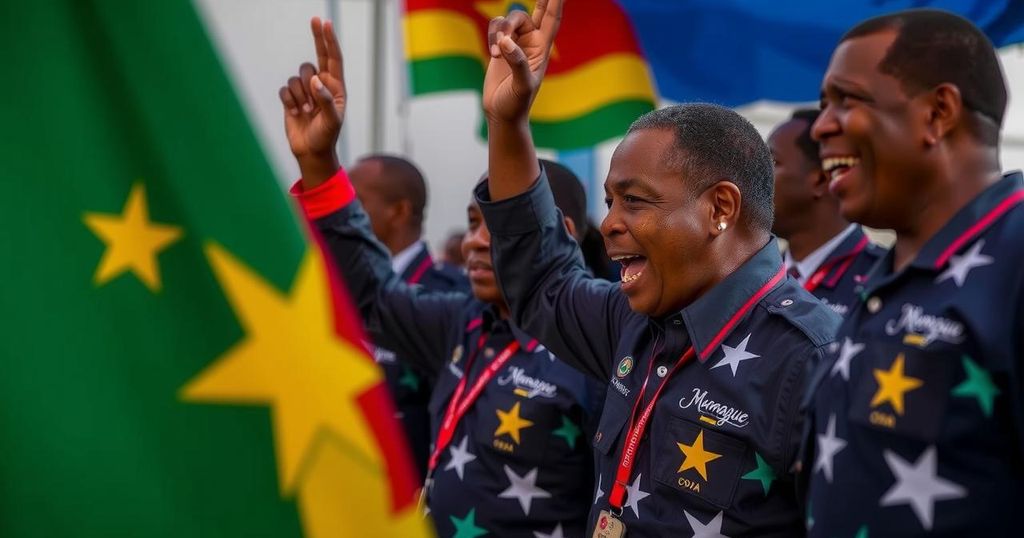Mozambique’s Ruling Party Claims Election Victory Amidst Violence and Allegations of Fraud
Daniel Chapo from the ruling Frelimo party has won the presidential election in Mozambique with 70.7% of the vote, while opposition candidate Venâncio Mondlane received 20.3%. The election was marred by violence, including the killings of key opposition figures and allegations of electoral fraud, including the registration of fake voters and manipulations during vote counting. Public protests are anticipated as the opposition calls for change and accountability amidst these serious concerns.
In Mozambique, the candidate representing the ruling party, Frelimo, Daniel Chapo, has decisively won the presidential election, securing 70.7% of the vote according to the election commission’s announcement on Thursday. This outcome allows him to surpass the essential 50% threshold, thereby negating the need for a runoff election. The runner-up, Venâncio Mondlane, who resonated with younger voters and alleged that he was the rightful election victor, garnered 20.3% of the votes against three additional candidates. The election, which took place on October 9, was overshadowed by violence, particularly marked by the tragic killings of Elvino Dias, an opposition lawyer preparing a legal challenge to the election results, and Paulo Guambe, an official from the Podemos party aligned with Mondlane. Civil society organizations had leveled serious accusations against Frelimo, asserting that nearly 900,000 fraudulent voters were registered within an overall electorate of 17 million. Observers, both local and international, subsequently reported discrepancies during the vote count, with Mozambican Catholic bishops citing instances of ballot stuffing and European Union observers documenting various irregularities. Mozambique continues to grapple with being one of the most impoverished nations globally, still recovering from the aftermath of hidden corrupt loans exceeding $2 billion uncovered in 2016, which precipitated the withdrawal of financial support from the International Monetary Fund (IMF) and other international entities, leading the economy into a spiral of decline. In a bid to mobilize support, Mondlane, a former radio DJ, rallied young voters—whose average age is below 18—with calls for peaceful demonstrations via social media. He asserted, “The time has come for the people to take power and say that we now want to change the history of this country. There won’t be enough bullets for everyone, there won’t be teargas for everyone, there won’t be enough armoured vehicles.” Zenaida Machado from Human Rights Watch has urged the government to uphold the rights to peaceful protest and to thoroughly investigate reports of violence and arbitrary detentions of protesters and journalists covering these events. She expressed justified concern over the potential actions of security forces based on their prior conduct.
The political landscape in Mozambique has been heavily influenced by the ruling party Frelimo, which has maintained power for nearly half a century. The recent presidential election has drawn attention not only for its results but also for the serious allegations of violence and electoral fraud that have emerged. The country’s history of political turmoil and accusations of corruption, particularly linked to undisclosed loans revealing systemic financial malfeasance, provide critical context for understanding the current electoral climate and the public’s reaction to the elections. The significant youth demographic in Mozambique has increasingly sought change, as shown through the support for the opposition candidate and calls for reform.
In conclusion, the recent elections in Mozambique highlight a contentious political environment marred by allegations of fraud and associated violence. Daniel Chapo’s victory presents a continuation of Frelimo’s long-standing rule, yet the rise of Venâncio Mondlane reflects a growing desire among the youth for change and accountability. The killing of opposition figures and accusations of electoral manipulation raise critical concerns regarding human rights and democratic processes in the nation. The international community and local observers remain vigilant as Mozambique navigates these turbulent political waters.
Original Source: www.theguardian.com




Post Comment